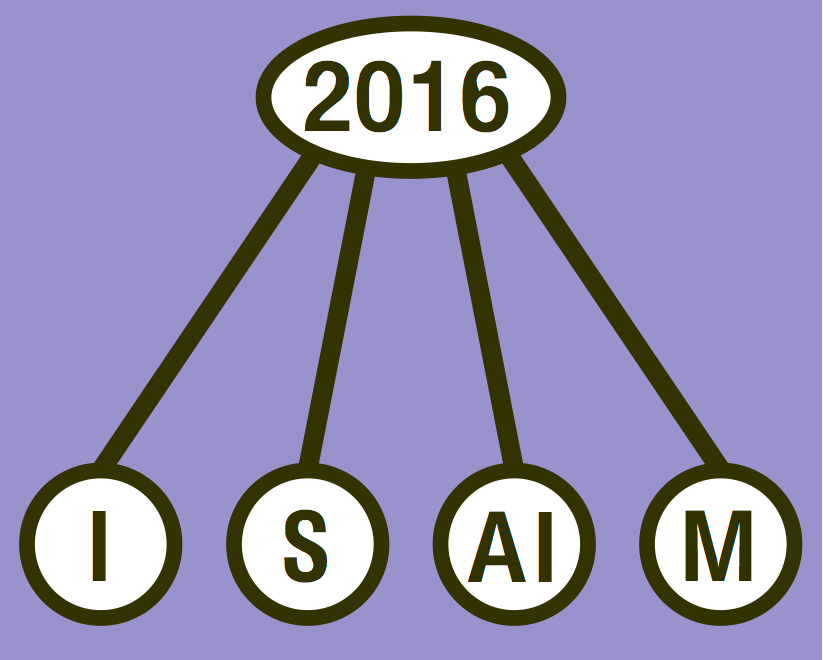Keynote Speakers
Yixin Chen (Washington University in St Louis)
Title: Interplay between machine learning and artificial intelligence
In the era of big data, we need novel algorithms on top of the supporting platform. In this talk, I will focus on the interaction between machine learning algorithms and traditional artificial intelligence techniques including graph search, combinatorial optimization, and planning. In particular, I will discuss two works. The first one applies manifold learning and dimensionality reduction algorithms to speed up graph search and automated planning. The second one applies graph search to solve submodular optimization problems arising from machine learning contexts. These works shed new insights into the deep connection between machine learning and AI.
Bio
Yixin Chen is a Professor of Computer Science at the Washington University in St. Louis. His research interests include data mining, machine learning, artificial intelligence, and optimization. He received a Ph.D. in Computing Science from the University of Illinois at Urbana-Champaign in 2005. He received the Distinguished Paper Award at the AMIA Conference (2015), Best Student Paper Runner-up Award at the ACM SIGKDD Conference (2014), Best Paper Award at the AAAI Conference on Artificial Intelligence (2010), and the International Conference on Tools for AI (2005). His work on planning has won First Prizes in the International Planning Competitions (2004 & 2006). He received an Early Career Principal Investigator Award from the Department of Energy (2006) and a Microsoft Research New Faculty Fellowship (2007). His research has been funded by NSF, NIH, DOE, Microsoft, and Memorial Sloan-Kettering Cancer Center. He is an Associate Editor for ACM Transactions of Intelligent Systems and Technology and serves on the Editorial Board of Journal of Artificial Intelligence Research.
Rina Dechter (University of California, Irvine)
Title: Modern Exact and Approximate Combinatorial Optimization Algorithms (max-product and max-sum-product) for Graphical models
In this talk I will present several principles behind state of the art algorithms for solving combinatorial optimization tasks defined over graphical models (Bayesian networks, Markov networks, constraint networks, satisfiability) and demonstrate their performance on some benchmarks.
Specifically I will present branch and bound search algorithms which explore the AND/OR search space over graphical models and thus exploit problem’s decomposition (using AND nodes), equivalence (by caching) and pruning irrelevant subspaces via the power of bounding heuristics. In particular I will show how the two ideas of mini-bucket partitioning which relaxes the input problem using node duplication only, combined with linear programming relaxations ideas which optimize cost-shifting/re-parameterization schemes, can yield tight bounding heuristic information within systematic, anytime, search. I will then show our recent extension to solving the far more challenging task of Marginal Map (as time permits).
Notably, a solver for finding the most probable explanation (MPE or MAP), embedding these principles has won first place in all time categories in the 2012 PASCAL2 approximate inference challenge, and first or second place in the UAI-2014 competitions.
Parts of this work were done jointly with: Radu Marinescu, Kalev Kask, Alex Ihler, Robert Mateescu, Lars Otten, and Natalia Flerova.
Bio
Rina Dechter is a professor of Computer Science at the University of California, Irvine. She received her PhD in Computer Science at UCLA in 1985, an MS degree in Applied Mathematics from the Weizmann Institute and a B.S in Mathematics and Statistics from the Hebrew University, Jerusalem. Her research centers on computational aspects of automated reasoning and knowledge representation including search, constraint processing and probabilistic reasoning.
Professor Dechter is an author of ‘Constraint Processing’ published by Morgan Kaufmann, 2003, and ‘Reasoning with Probabilistic and Deterministic Graphical Models: Exact Algorithms’ by Morgan and Claypool publishers, 2013, has co-authored over 150 research papers, and has served on the editorial boards of: Artificial Intelligence, the Constraint Journal, Journal of Artificial Intelligence Research, Logical Methods in Computer Science (LMCS) and journal of Machine Learning (JLMR). She was awarded the Presidential Young investigator award in 1991, is a fellow of the American association of Artificial Intelligence since 1994, was a Radcliffe Fellowship 2005-2006, received the 2007 Association of Constraint Programming (ACP) research excellence award and is a 2013 Fellow of the ACM. She has been Co-Editor-in-Chief of Artificial Intelligence, since 2011.
Ariel Procaccia (Carnegie Mellon University)
Title: Computational Fair Division
I will present an exciting new interaction between AI and fair division theory, which is leading to some of the first-ever applied fair division methods. In particular, I will explain how computational thinking provides a novel perspective on the classic problem of allocating indivisible goods, and how these ideas are integrated into Spliddit (http://www.spliddit.org), a not-for-profit fair division website that aims to make the world a bit fairer. I will also describe our ongoing work with California school districts to develop a practicable mechanism for fairly and trutfully allocating classrooms to charter schools, which has given rise to novel theoretical questions as well as nontrivial computational challenges.
